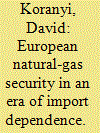| Srl | Item |
| 1 |
ID:
142923


|
|
|
|
|
| Summary/Abstract |
An interview with Ambassador Richard Morningstar, founding director of the Global Energy Center at the Atlantic Council, is presented. He discusses the reasons behind the declining energy prices, the current and future economic and political impacts of a decline in energy prices, and issues arising in the nexus of energy and geopolitics, in light of advances in renewable energy and developments in global climate change.
|
|
|
|
|
|
|
|
|
|
|
|
|
|
|
|
| 2 |
ID:
131139


|
|
|
|
|
| Publication |
2014.
|
| Summary/Abstract |
As the Crimean crisis continues to develop, it is becoming clear that Ukraine's reliance on Russia for gas imports may prove to be a fundamental weakness, with the latter wielding price increases as an economic weapon. With Russia threatening to simply cut off these crucial supplies to its neighbour, the conflict has also served to underscore key questions about European energy security more broadly. David Koranyi assesses the status quo before analysing Europe's options for supply diversification, focusing primarily on its central and southeastern regions.
|
|
|
|
|
|
|
|
|
|
|
|
|
|
|
|
| 3 |
ID:
100928


|
|
|
|
|
| Publication |
2010.
|
| Summary/Abstract |
The ongoing disputes between Russia and its neighbouring states vis--vis the critical transmission of primary energy resources to the remainder of the European continent has led Brussels to place the matter squarely within the scope of European Union (EU) energy security policy. EU-Russia energy negotiations have more often than not displayed patterns of rationalism with an ingrained cost-benefit orientation. Notwithstanding, this incidence has been complicated by the reality of changing geo-political constellations in Central and Eastern Europe in the course of the past two decades. This has influenced the political landscape of EU-Russia negotiations concerning projects under construction, as well as proposed others on the continent, such as Nord Stream (bypassing Belarus and Poland) and South Stream (bypassing Ukraine). Given such considerations, we observe that the Czech Presidency of the Council of the EU in the first half of 2009 has shown greater leniency towards Ukraine, Belarus and Poland than the general consensus in EU-Russia energy talks maintained in Brussels would have otherwise provided for. We also observe that France and Germany are driven by a greater rational self-interest in their conduct of EU energy security policy. In consequence, Russia's awareness of the divergent dispositions amongst the EU Member States becomes the dependent variable in our analysis. Thus, the primary question that this paper poses is whether rational cost-benefit orientations in individual EU Member States can lead to collective bargaining outcomes in EU-Russia energy negotiations.
|
|
|
|
|
|
|
|
|
|
|
|
|
|
|
|
| 4 |
ID:
084709


|
|
|
|
|
| Publication |
2008.
|
| Summary/Abstract |
This article examines the effect of increased state control over the Russian gas sector and its ultimate impact on energy security in Europe. The various mechanisms by which the state has acquired ownership (or quasi-ownership) over several independent gas producers as well as the potential dangers this poses for European energy supplies are scrutinised. Due to the demonstrated inefficiency of Russian state-controlled companies, negative consequences, such as slowed production growth, are likely to result. The few remaining independent gas producers are still hampered in their development due to the government's reluctance to implement structural reforms in the Russian gas sector.
|
|
|
|
|
|
|
|
|
|
|
|
|
|
|
|